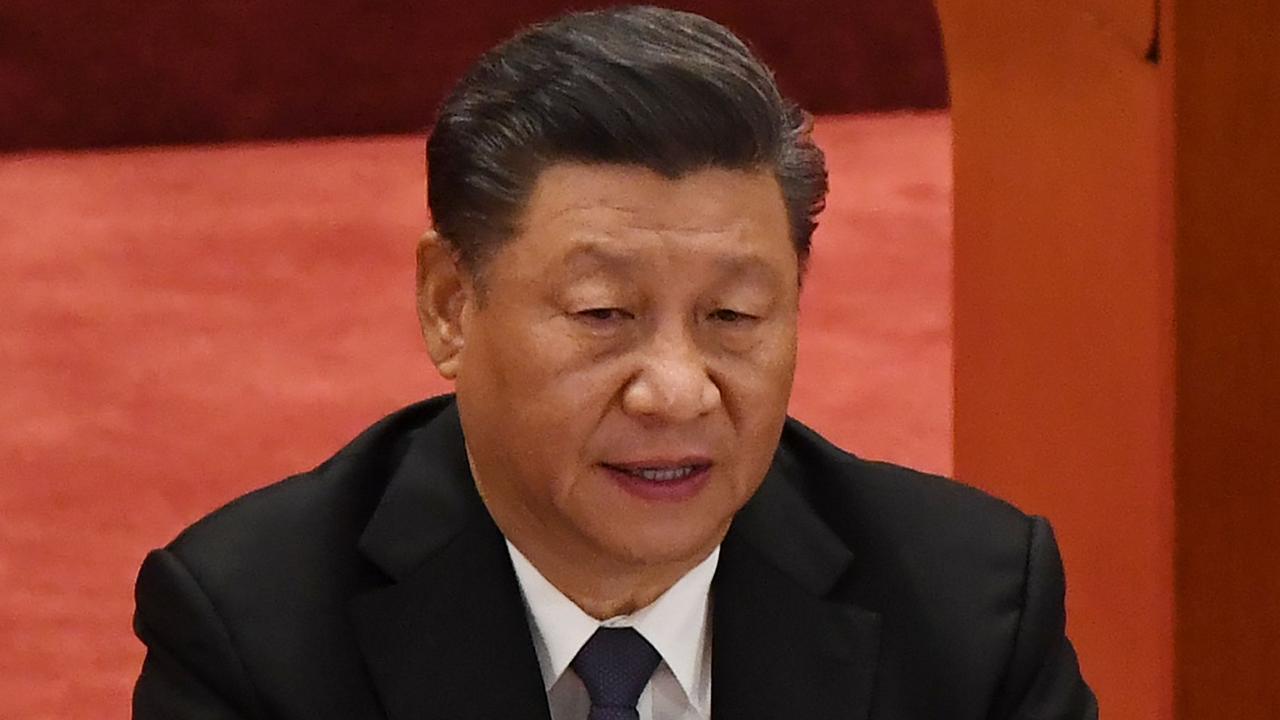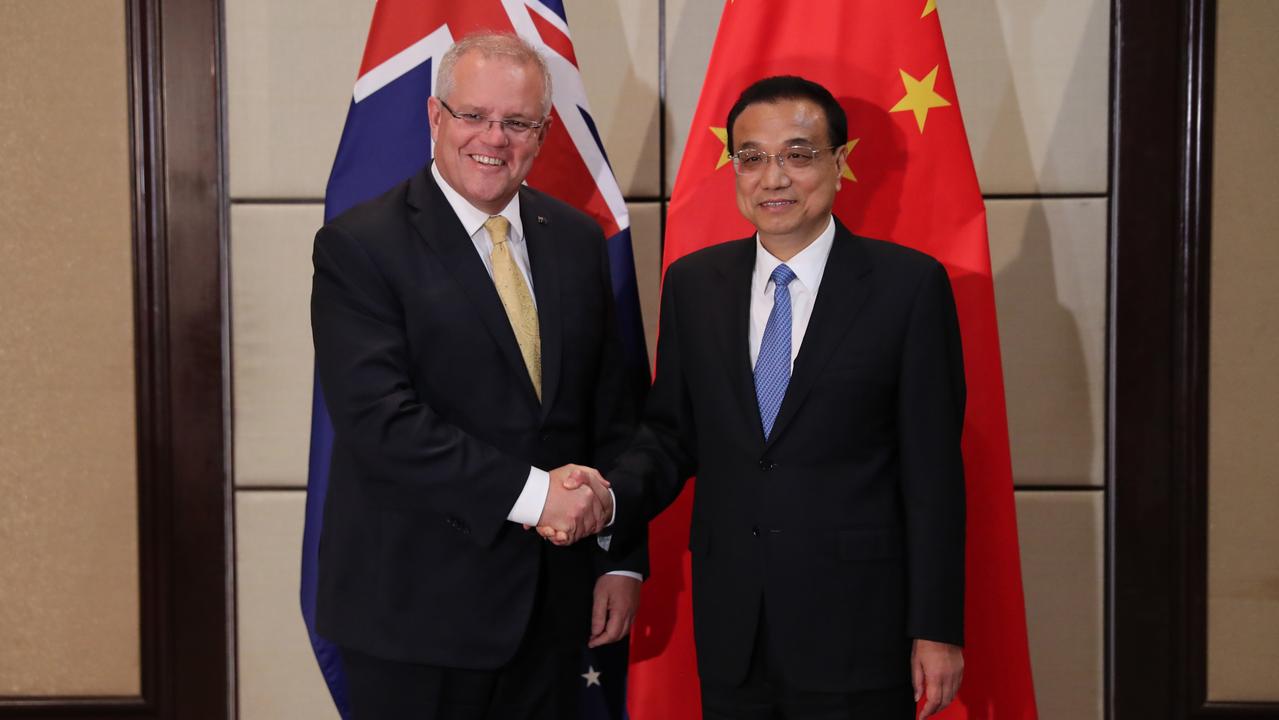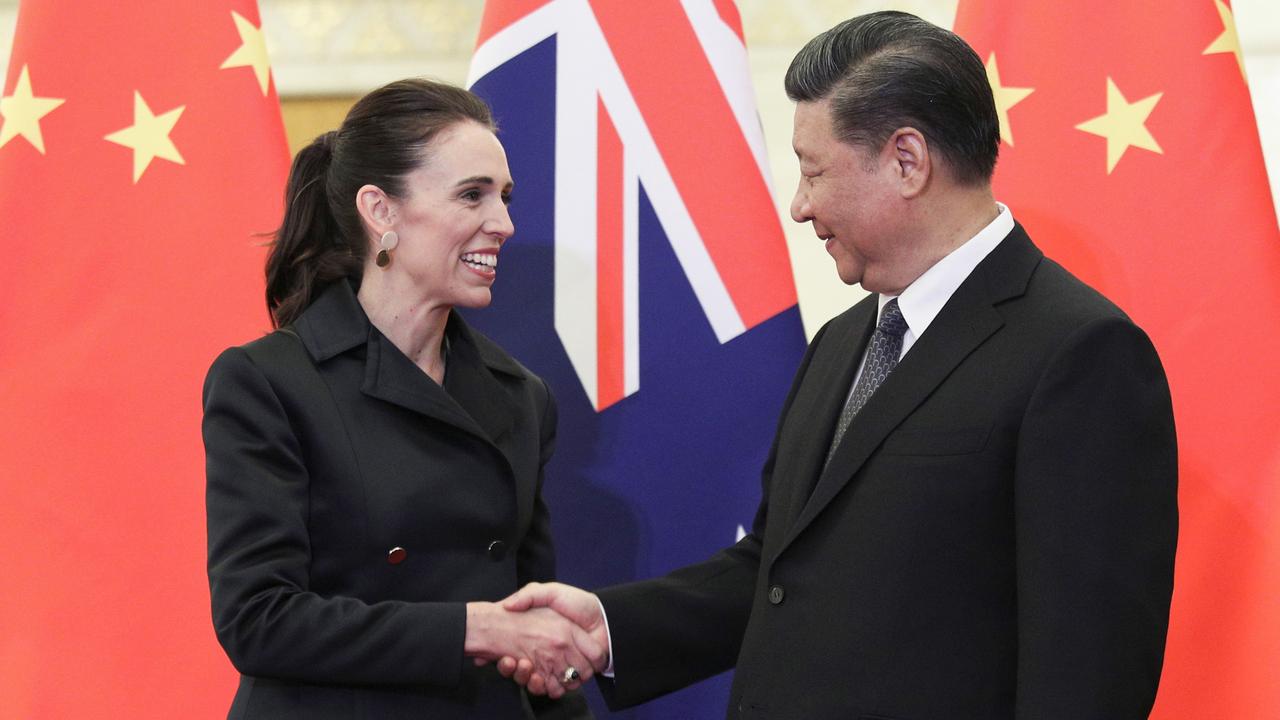China says suspension of trade talks ‘necessary’ response to Australia’s ‘insane, Cold War mentality’
China has described a decision to cancel trade talks as a “necessary” response to Australia’s “insane” actions as relations continue to worsen.
China has described its decision to cancel bilateral trade talks as a “necessary” response to Australia’s “insane” actions and “Cold War mentality”.
Foreign Ministry spokesman Wang Wenbin told reporters on Thursday that “the Australian side must take all responsibility” for the talks being cancelled.
Ominously, Beijing for the first time used an explicit political justification for its decision. China had previously justified bans on Australian exports — such as beef and wine — on labelling and health issues.
“We always believe that a sound and steady China-Australia relationship is in the fundamental interests of both countries and that bilateral co-operation is mutually-beneficial in nature,” he said.
“That said, mutual respect and mutual trust is the prerequisite of dialogue and practical co-operation between countries. For some time, the Australian side, in disregard of China‘s solemn position and repeated representations, doubled down on restriction and suppression of China-Australia co-operation projects in trade, culture and people-to-people exchanges by falsely citing ‘national security’ reasons.”

Mr Wang said this had “severely damaged mutual trust and undermined the foundation for normal exchange and co-operation” and that China had “no other choice but to make necessary and legitimate responses”.
“The Australian side must take all responsibility for this,” he said.
“We urge the Australian side to cast aside the Cold-War mentality and ideological bias, view China’s development and China-Australia co-operation in a truly objective light, return to the rational track without further delay and correct its mistakes. It should stop the insane suppression targeting China-Australia co-operation, stop politicising and stigmatising normal exchange, and stop going further down the wrong path.”
China’s National Development and Reform Commission (NDRC) announced on Thursday that it would “indefinitely suspend” all activities under the China-Australia Strategic Economic Dialogue (SED) as a result of Australia’s “ideological discrimination” against the country.
Trade Minister Dan Tehan said on Thursday it was “disappointing to hear” of the decision, describing the SED as “an important forum for Australia and China to work through issues relevant to our economic partnership”.
“We remain open to holding the dialogue and engaging at the ministerial level,” he said.
Chinese ministers have failed to take any calls from their Australian counterparts in more than a year.

Relations between Canberra and Beijing have plummeted since 2018, when Australia became the first country to ban Chinese tech firm Huawei from its 5G network, further deteriorating last year after Prime Minister Scott Morrison led calls for an independent investigation into the origins of the coronavirus.
China has since imposed tariffs or disrupted more than a dozen key industries including wine, lobster, barley, timber and coal, decimating exports.
The China-Australia talks, which have been held three times since 2014 with the last occurring in 2017, are the main bilateral economic forum between Australia and its largest trading partner.
The NDRC’s announcement came in response to the Australian federal government’s decision last month to tear up Victoria’s controversial Belt and Road Initiative co-operation deal with China under new foreign relations laws.
According to the state-run Global Times, it was the last round of SED talks that indirectly led to Victoria signing up for the Belt and Road Initiative, as well as the signing of a free-trade deal, and the use of UnionPay cards in Australia.
The newspaper noted that there were now doubts about the China-Australia Annual Prime Ministerial Meeting.
The seventh round of the annual meeting was held in Bangkok in 2019 between Chinese Premier Li Keqiang and Mr Morrison. The 2020 meeting was cancelled due to the coronavirus outbreak.
Chen Hong, a professor at East China Normal University, told the Global Times that the move to cancel the SED talks was significant, being the first major announcement made by Beijing on the first working day after the five-day May Day holiday.
Zhou Fangyin from Guangdong University of Foreign Studies told the outlet that such a suspension was “very rare within China’s diplomatic course with major countries, which underscores China’s strong objection to the move and sends a clear warning to Australia that China is determined, and is ready to employ all necessary tools to defend its legitimate interests”.
“Australian Prime Minister Scott Morrison should understand China’s bottom line and drop the fantasy that China may retreat on Australia’s unreasonable provocations,” Mr Zhou said.
James Laurenceson, director of the Australia-China Relations Institute at University of Technology Sydney, told news service AFP it was “mainly a symbolic move, but still the trend (of) discussion and dialogue being suspended at lower and lower levels is a real concern”.
“Overall, what we’re seeing in Canberra and Beijing is both sides doubling down and hardening their stance,” he said.

The Australian’s foreign editor Greg Sheridan said the decision was noteworthy “for its explicit political justification”.
“There was no nonsensical justification about Australian coal being too dirty, or our pineapples too spiky, or our wine too flavoursome or whatever,” he wrote on Friday.
With the Northern Territory government’s controversial 99-year lease of the Port of Darwin to Chinese-owned company Landbridge now in the crosshairs of the federal government – and in particular the newly hawkish Defence Department under Peter Dutton – experts have warned of further retaliation.
Mr Dutton told The Sydney Morning Herald his department had been asked to “come back with some advice” about the 2015 deal and refused to rule out forcing Landbridge to divest on national security grounds.
“A decision by Canberra to rescind the Port of Darwin lease, even if full and fair compensation were paid to Landbridge, would have significance for Beijing far beyond Australia,” Sheridan wrote.
“Without the Australian government engaging in international advocacy, it would damage Beijing’s ability to replicate such arrangements in other nations.”
Asked at his Thursday press conference if there would be any specific trade impact as a result of the talks’ cancellation, Mr Wang did not say – but he praised New Zealand Prime Minister Jacinda Ardern for her softer stance and her commitment to the “one China policy”.
“China stands ready to work together with New Zealand to forge ahead and break new ground, strengthen dialogue, deepen co-operation, rise above disturbances and work for greater progress in our comprehensive strategic partnership,” he said.
“China does not intend to engage in systemic competition or ideological confrontation with Western countries. Our development does not come at the expense of other countries’ interests. On the contrary, it presents immense development opportunities for all. We are ready to enhance co-operation with all sides including New Zealand to contribute to world peace and development.”
China has previously indicated that New Zealand, which has attempted to distance itself from the Five Eyes intelligence alliance with the US, UK, Canada and Australia, would reap the economic benefits.
– with AFP




